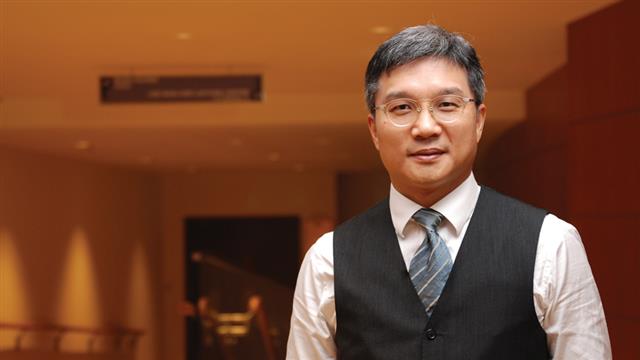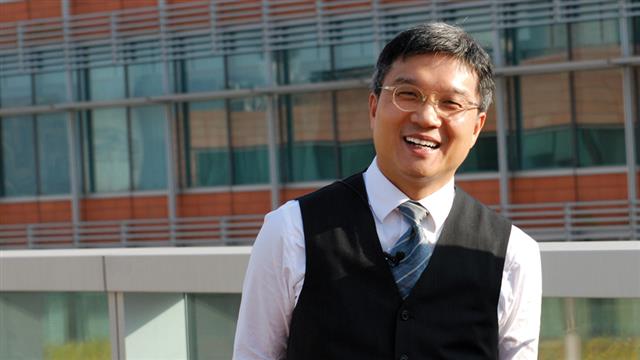-
Music, Chung Chi College, 1992
-
Award for Best Artist (Music), Hong Kong Arts Development Awards 2013
-
Chairperson, Department of Music, University of Hong Kong
Can you tell us how you fared on composition after graduating from the CUHK?
I obtained two scholarships from CUHK to pursue my master's and doctoral studies at the University of Illinois in the US. After returning to Hong Kong in April 1997, I taught some part-time programmes at the Chinese University and joined the University of Hong Kong in 1998. Predictably, I didn't get many commissioned composition jobs at the beginning. However, I did give my best whenever there was one. Gradually more people came to know about me and I started to work with orchestras, dance troupes and virtuosi. The more recent ones include two operas commissioned by the Hong Kong Arts Festival (HKAF)—Heart of Coral in 2013 and Datong, the Chinese Utopia in 2015.
You have written two chamber operas within a couple of years, both based on historical figures in modern China. Why so?
After working on instrumental and vocal music, and also music for dance drama for so many years, I'm prepared for a bigger challenge. Opera seems to be a justified choice since it involves practically the most complicated combination of art forms in all musical genres. The year 2011 marked the 100th year of Xiao Hong's birth. The HKAF asked me in 2012 to write an opera on this female writer. I found the script written by Yi Heng very poetic, and the crew, with Helen Lai as director, irresistible. So I grabbed the golden opportunity to write my first opera—Heart of Coral. Building on the successful collaboration, the HKAF got me to work with librettist Mr. Evans Chan and director Tang Shu-wing. I've learnt a lot through cooperating with artists in various fields.
What do you want to experiment in the two Chinese chamber operas?
Chamber opera, in comparison with full-blown opera of three to four hours in duration, is produced on a much smaller scale in terms of instrumentation, cast, stage set-up and design, and budget. So it is a good starting point for a first-time opera composer. The biggest issue is how to fit the words to music. Chinese, being a tonal language, makes it even more difficult. It's really not easy to blend in the human voice, libretto and instruments to create dramatic intensity and tell the story in an hour or so.
Is it apt to say that Chinese elements are typical of your works?
It's difficult to define 'Chinese elements'. I don't want to be labelled as a composer who habitually employs Chinese elements. A composer gathers various musical experiences in his process of growth and development, which help shape his own musical language. Some people may think I'm well versed in using Chinese instruments or Chinese elements, while others may consider that I'm good at integrating the East and the West. Some will lay down for me some parameters for instrumentation, without bothering to know how I would like the music to be written. I would say I'm good at capturing the irreplaceable characteristics of different instruments, be it erhu or violin, and this profound knowledge in instruments, rather than the so-called Chinese elements, is consistently found in my works.
How do Chinese elements find their place in music, other than a Chinese background?
'Chinese elements' is a myth to both reviewers and composers. You won't ask a German or American composer to write music in a German or American manner, but you will definitely expect a Chinese composer to feature something Chinese. When a composer introduces his work on alien soil, the identity of a 'Chinese composer' is somewhat overemphasized. Some so-called Chinese elements are very superficial. People tend to equate the pentatonic scale with Chinese music. If it is that simple, is Auld Lang Syne, which is entirely pentatonic, Chinese music? I don't want to be too artificial or superficial, like conveniently assigning chords in Western music to a Chinese melody. I want to do it with some depth. Let's say, the cadence in Western music is usually presented in form of chord progression, but in Chinese music, it is usually expressed by changes in tempo and tone colour. I'm actually more concerned with exploring ways to build up the architecture for Chinese music.
Talking about Heart of Coral, some people felt a sense of loss hearing nothing resembling Western operatic arias. Was the absence of arias purposely planned? Prof. Leo Lee said it lacked lyricism. Did you adjust the way you write Datong in response to these comments?
One won't find any melodious arias like Puccini's and Verdi's in most of the post-20th-century operas. Shall we still write operas using the musical language of romanticism? I wonder. Yet I did not make Heart of Coral 'avant garde' because the script is not fit for that. I wrote some melodious lines which some criticized as 'banal'. Does it mean a work must be difficult to be 'avant garde'? But I really didn't want to be difficult. Why should I ask the peasants in Northeast China to sing avant garde music in Act 1? I gave them some lines in pentatonic scale, easy listening but with a complex internal structure. I consider the dialogue between the two protagonists very lyrical, though it may not be Puccini enough. While a composer must have the audience in mind when he writes music, he should also follow his own artistic sense. Lyricism is good to have when it serves to express the feelings of the character and facilitate the flow of the story, as in the Mahler style aria I wrote for Kang Youwei in Datong when he learnt about the execution of his comrade Tan Sitong. To me, lyricism in modern opera spans across a wide spectrum, not necessarily following Puccini, Mozart or romanticism.
What do you most treasure in your CUHK years?
I remember the Department of Music then was housed in a small hub in its own building. We had the best musical resources in Hong Kong and we used to stay overnight in the audio-visual library during the exam season. We were occasionally visited by snakes in the studio, and swamps of mosquitoes in the evening. But staying together like a family is something unforgettable. I treasured the days of small classes when student-teacher ratio was low and interaction was close. Sometimes one teacher attended to only two to three students. The teacher would keep asking questions. As we racked our brains for an answer, Prof. David Gwilt would use his casual humourous remark to enlighten us. His words of wisdom are so useful that I would quote them as if they are mine when I teach music theories now.
What advice would you give to young students who aspire to take up composition as their profession?
I did give some thought to making a living on composition when I went abroad for my postgraduate studies in the US. An upperclassman from CUHK told me, 'Forget it, it's a dead end! Don't worry about it until you complete your studies.' To be honest, the effort is disproportionate to the monetary reward. But the studies in arts and creative work are both driven by passion, which is close to religious fervour and love. So if you have interest and know that you've got the talent, don't think too much about the prospects. Just do it. Here in Hong Kong, the room for musical creation and publication has grown tremendously in recent years than when I was a student. You will find your path ultimately. I've also come along slowly step by step.



